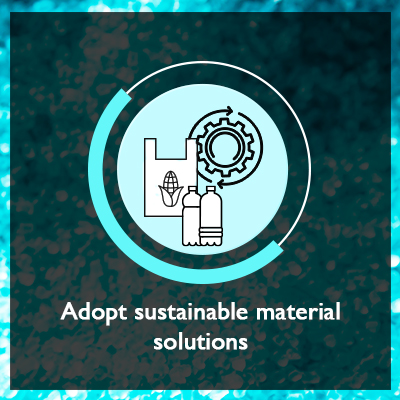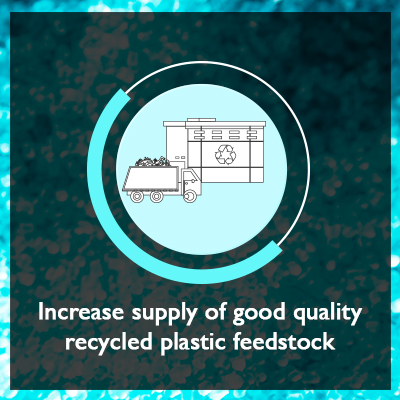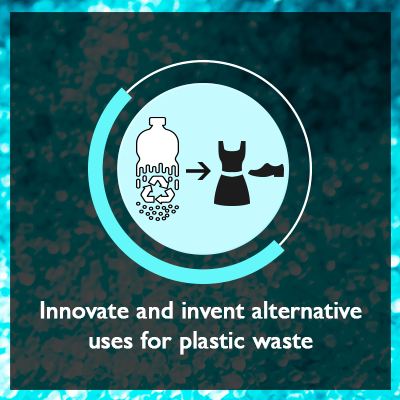Plastic waste often possesses significant untapped value which when regenerated through circular economy principles can help minimise its environmental impact. This second article in series discusses the key objectives and actions offered by TERI's roadmap to show the environmental action value of plastics

Finding a material as flexible and versatile as plastics in the present day and even for next few decades will be extremely difficult. Owing to its light weight nature, durability, chemical and thermal resistance, it finds application in various sectors including packaging, construction, electrical and electronic equipment and automobiles. The benefits of plastics however, often get overshadowed by issues caused due to the littering and mismanagement of plastic waste. For long, the role that plastic can play in furthering climate action has also been ignored. In these huge piles of plastic waste that stand on our landfills or overflow out of the garbage dumps, lies significant unrealised environmental and economic value.
TERI's report, 'Circular Economy for Plastics in India: A Roadmap' points at the unrealised value of plastic waste and the ways in which their environmental impact can be minimised. In addition, the report also looks at the plastic production side of the value chain suggesting practices that could foster circularity. The report lays down three key objectives across the plastic value chain to regenerate, preserve and reutilise as much value as possible.
Adopting Sustainable Material Solutions

The plastic value chain is carbon intensive from the get go as the raw materials required for plastic production are majorly derived out of fossil fuels (oil and natural gas). Adopting sustainable material solutions for the value chain can bring down the plastic industry's reliance on fossil fuels. The roadmap suggests various interventions such as bringing circular design to plastic products by ensuring that they are developed using easier to recycle polymer formats. It calls for increased Research and Development (R&D) on bio-based polymers (plant fibres, starch etc.) through public funding and technological support from the private sector. Levy of differentiated taxes on the use of virgin plastic versus recycled plastics in the production process to incentivise the use of the latter is another recommendation that the roadmap offers.
While the above actions suggested in the roadmap aim to minimise carbon emissions at the upstream (raw material production) and midstream (manufacturing and use) stages in the plastic value chain, the roadmap also looks at ways to reclaim lost value in the downstream (disposal and end of life treatment) processes.
Increase Supply of Good Quality Secondary Plastics Feedstock

In India, over 60% of plastic waste gets recycled, but most of this recycling happens in the informal sector, which leads to quality issues with the recycled material. As a result, the share of recycled plastic that could replace virgin plastics is very minimal, which continues the dependence on virgin plastic. There is also a high share of plastic waste that ends up in landfills, burnt, or leaked into the environment. Plastics that are difficult or hard to recycle because they are made of mixed materials/multi-polymers or are contaminated or dirty from use, end up mostly as mismanaged waste.
In order to reduce the plastic value chain's reliance on virgin plastics, the roadmap recommends increasing the supply of good quality recycled plastic as feedstock for plastic production. To achieve this objective, the roadmap proposes innovation in infrastructure for collection and separation of plastic waste from Municipal Solid Waste and its further sorting and segregation. Additionally, it recommends bringing behavioural changes amongst citizens to encourage source segregation of waste, thereby minimising contamination of plastic waste and enabling its improved recycling. The roadmap also suggests offering fiscal incentives to promote advanced forms of recycling like chemical recycling which can also help in creation of better-quality recycled material.
Invent, Innovate, and Encourage Alternative Uses of Difficult-to-Recycle Plastic Waste

There is a need to find innovative ways to manage hard to recycle plastic waste such as multi-layered packaging, or use the existing waste in innovative ways to further reduce the carbon footprint of the plastic value chain. In view of this, the roadmap proposes expanding reutilisation of difficult-to-recycle plastic waste in road construction and bricks and composite production. By promoting R&D for finding newer and more economically viable alternate use cases for plastics like upcycling discarded fishing gear into accessories, clothing, converting MLPs into value added products such as tiles and bricks, the report underlines various suggestions for fostering circularity through encouraging and supporting use of difficult to recycle plastic waste.
Containing, and more importantly, transforming plastics from being a source of waste to a resource is a huge challenge - one that requires support from major industry players, both public and private. By developing partnerships between industries and establishing decentralised co-processing facilities near major waste generating cities as suggested by the report, the benefits of circularity in India will make themselves clearly visible.
For a country looking to leverage every opportunity to move towards a low carbon pathway, plastic is too critical a sector to be neglected any longer. Reinventing plastics will require a paradigm shift both within the value chain but also in the consumer mindset. While streamlining the plastic value chain will certainly bring down the sector's reliance on fossil fuels in turn taking strides towards climate action. Addressing issues around plastic waste mismanagement and littering right from schools and home will go a long way in saving the environment. Public-Private partnerships in R&D for sustainable options for plastics, for advanced techniques to recycle plastics will greatly benefit the fight against climate change. Additionally, such interventions will open up space for new job opportunities thus driving the economy upwards.
The versatility of plastics expands across their use cases to a larger socio-economic fabric that is intricately knit around them. Thus, if changes are made to it keeping in mind the need to lower the value chain's carbon footprint by fostering circularity and sustainability, these effects will find themselves transferred to everything else linked to it including the economy, climate and the people.
This is the second article in the series 'Refurnishing Plastic for Climate Action'. To read the first article click here


